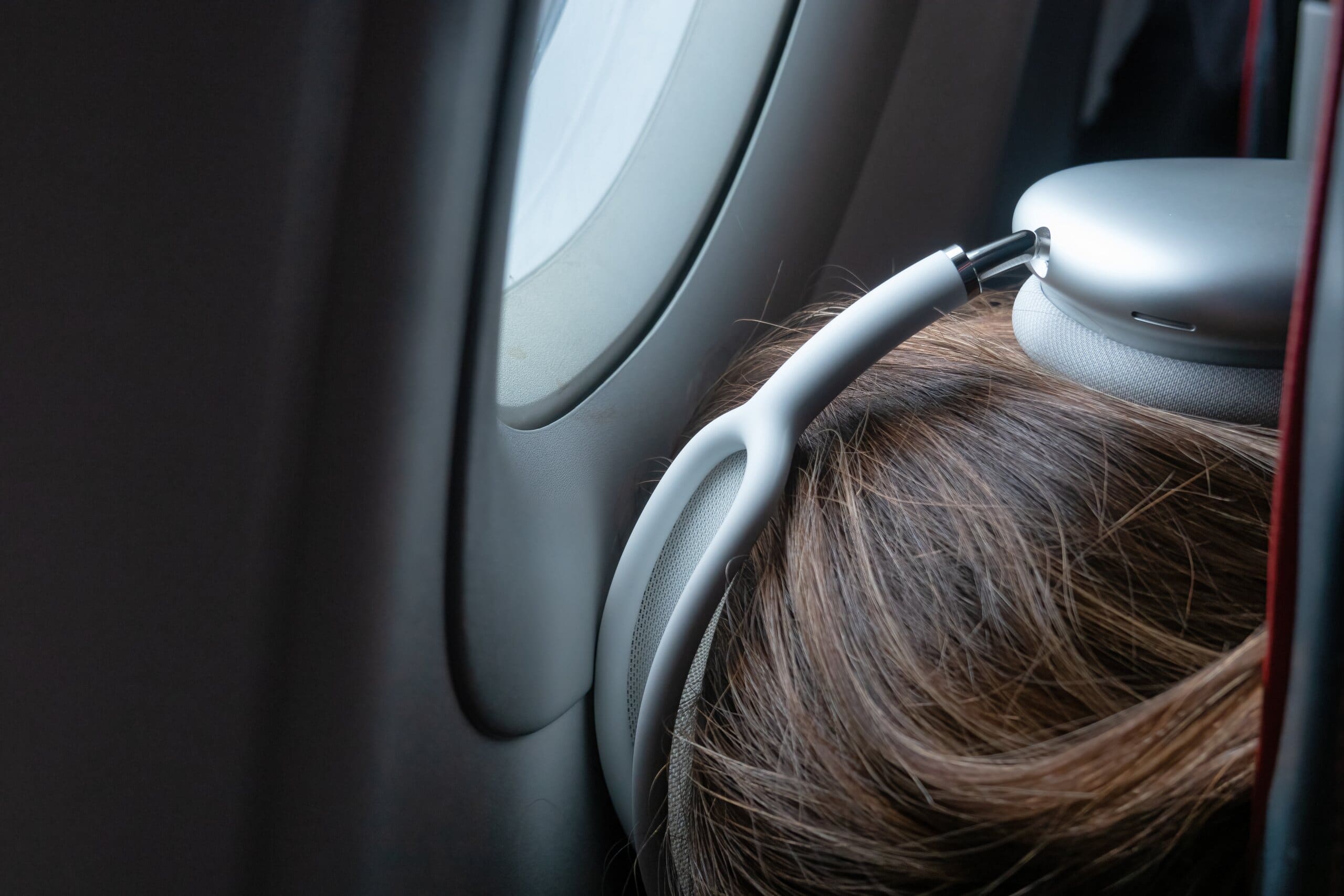If you’ve ever struggled to catch some sleep on a plane, you’re not alone. If sleeping in an upright position without a mattress or pillow wasn’t bad enough, plane cabins can also reach up to 85 decibels in volume, while the bright lights of a plane can make it difficult to get some shut-eye. All in all, it’s pretty difficult to hit the metaphorical hay once you’re airborne.
But the good news is that sleeping on a plane isn’t impossible, and our experts are right here with their favourite airplane sleeping hacks and advice that can help you get better sleep while you fly. Read on to learn exactly what these tips are for how to sleep on a plane successfully.
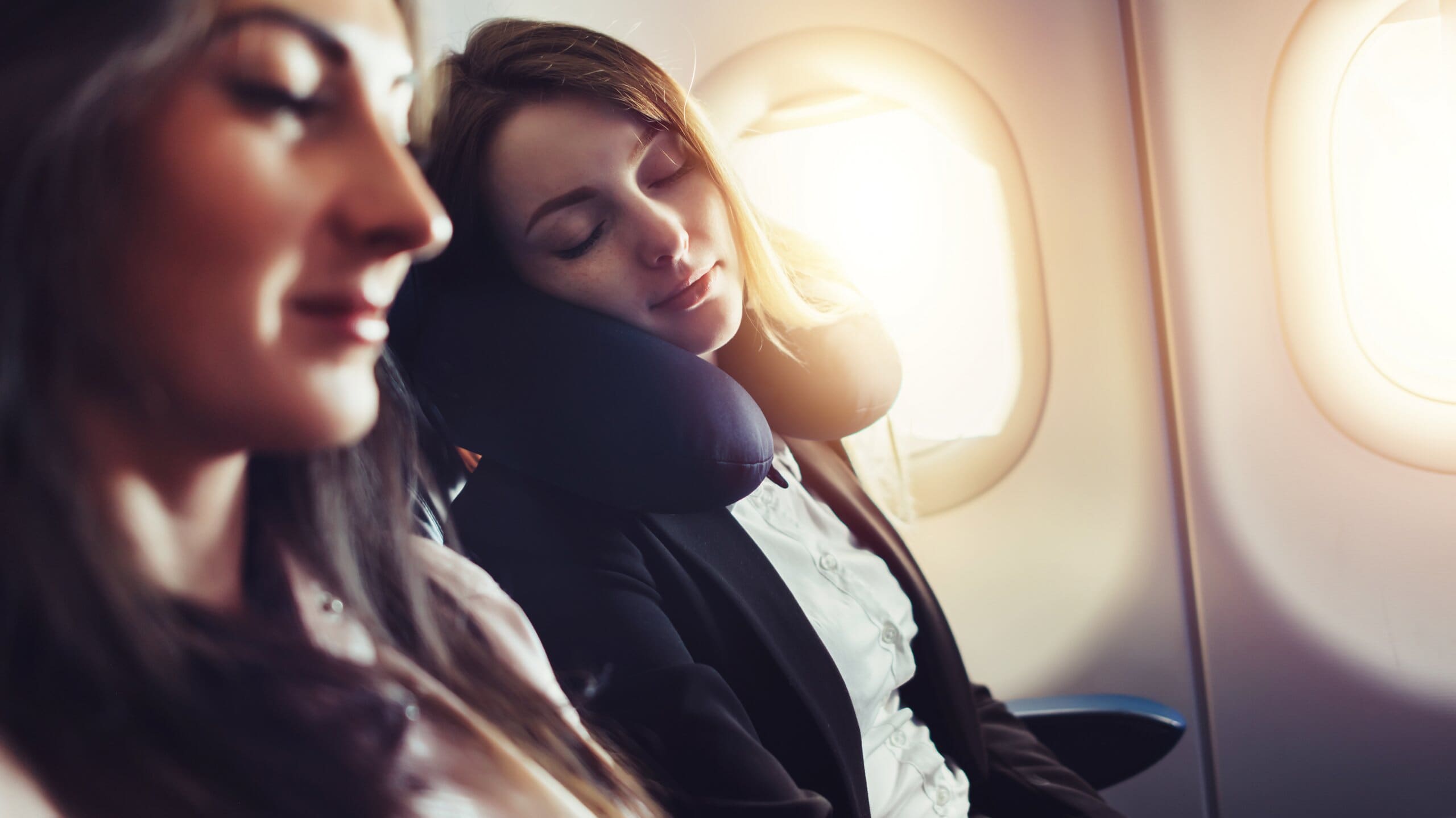
Our top 12 tips for how to sleep on a plane
Ready to get some shut-eye the next time you’re away? Here are our 12 unique tips for how to sleep on a plane more easily.
1. Get to the airport early for a 30-minute walk around duty-free
You should always head to the airport early to account for any delays, but a short walk before getting on your flight can help you sleep better once you’ve got settled on your plane. Before you board, spend 30 minutes walking around the airport, duty-free or in the lounge.
Studies show that just half an hour of moderate exercise helps you sleep better and that women who took more steps had higher-quality sleep. You obviously won’t be able to get a full workout in your terminal, but staying active can help you drift off more easily onboard your flight.
2. Book the seats before the engines for the best quality sleep
If you’re able to reserve a seat when flying, we recommend that you choose the seats ahead of the engines of the plane, as these are the biggest source of unwanted noise on a plane. The front of a cabin tends to be the quietest area onboard, but avoid sitting near the toilets if you don’t want to be interrupted by the chat of queueing passengers.
What’s more, you’ll be served first when the food cart comes down the aisle. We’ve all been woken up by attendants offering us tea and coffee, so avoid the interruption by getting your food and drink early.
Finally, while window seats may seem like the quieter option on a row, being far from the busy aisle, they’re also the closest to the engines of the plane. This means they’re often louder than other options, so you should be mindful if you’re hoping to keep noise levels at a minimum.
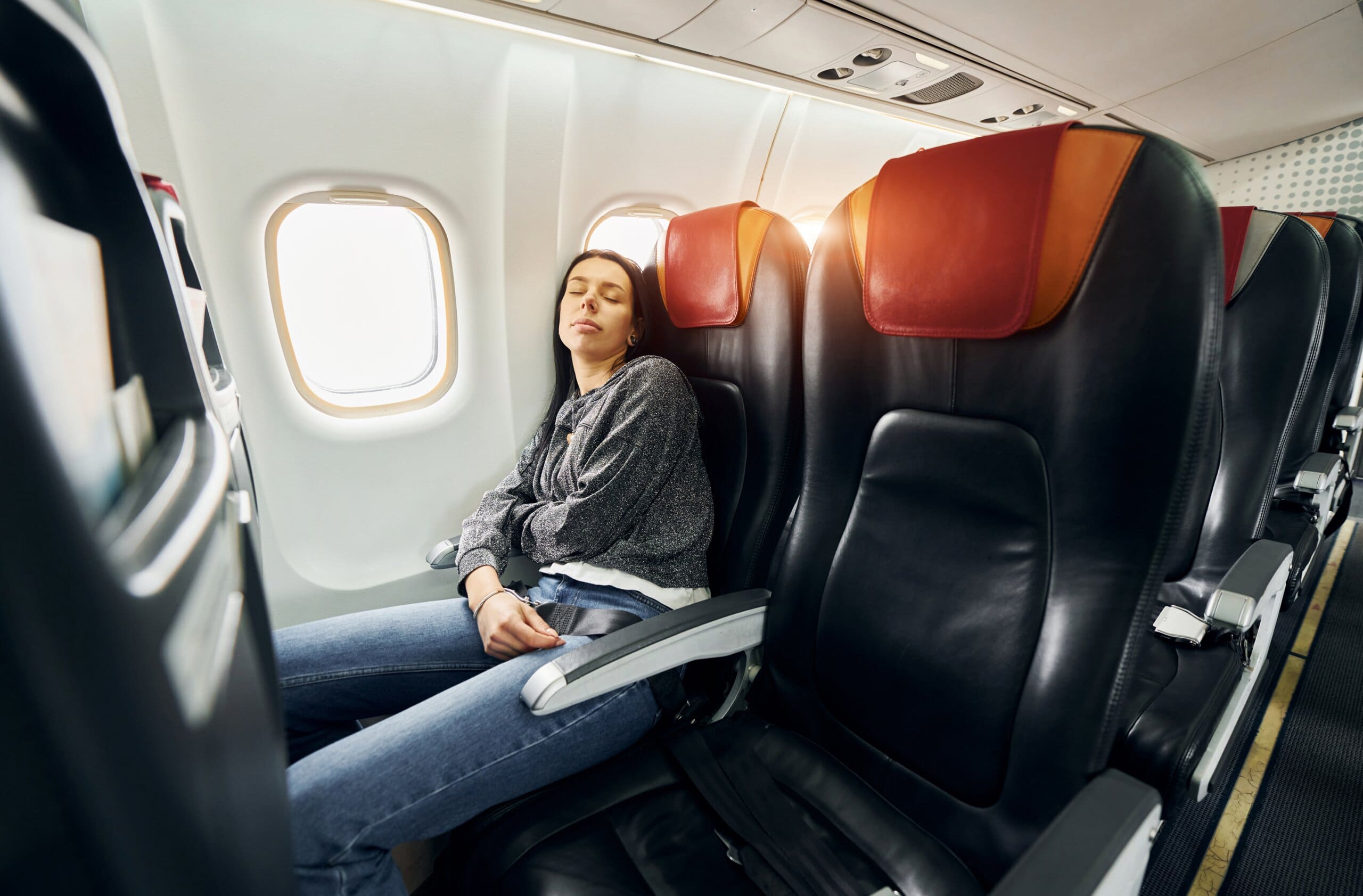
3. Board last and try to snag an empty row
This method is much more risky than reserving a good seat, but if your flight isn’t going to be fully booked, you can try boarding last and eyeing up the best seats left. If you find two or three empty seats together, you can take advantage of the extra room to get some sleep without cramping between other passengers.
4. Wear these socks to stop you from snoring
Planes are noisy enough, but the last thing you want is a seat next to someone who’ll be snoring loudly. Even worse, you could be the one snoring! Luckily, you can try to stay quiet while you sleep using flight socks.
Studies show that flight socks can half your number of bedtime disruptions! By wearing flight socks during the day, e.g., on a midday flight, you can prevent fluid building up in your legs, which travels up the body when lying down, causing snoring.
We recommend trying flight socks to cut down on snoring but make sure to wash them at 60 degrees after use to combat any bacteria living in your socks.
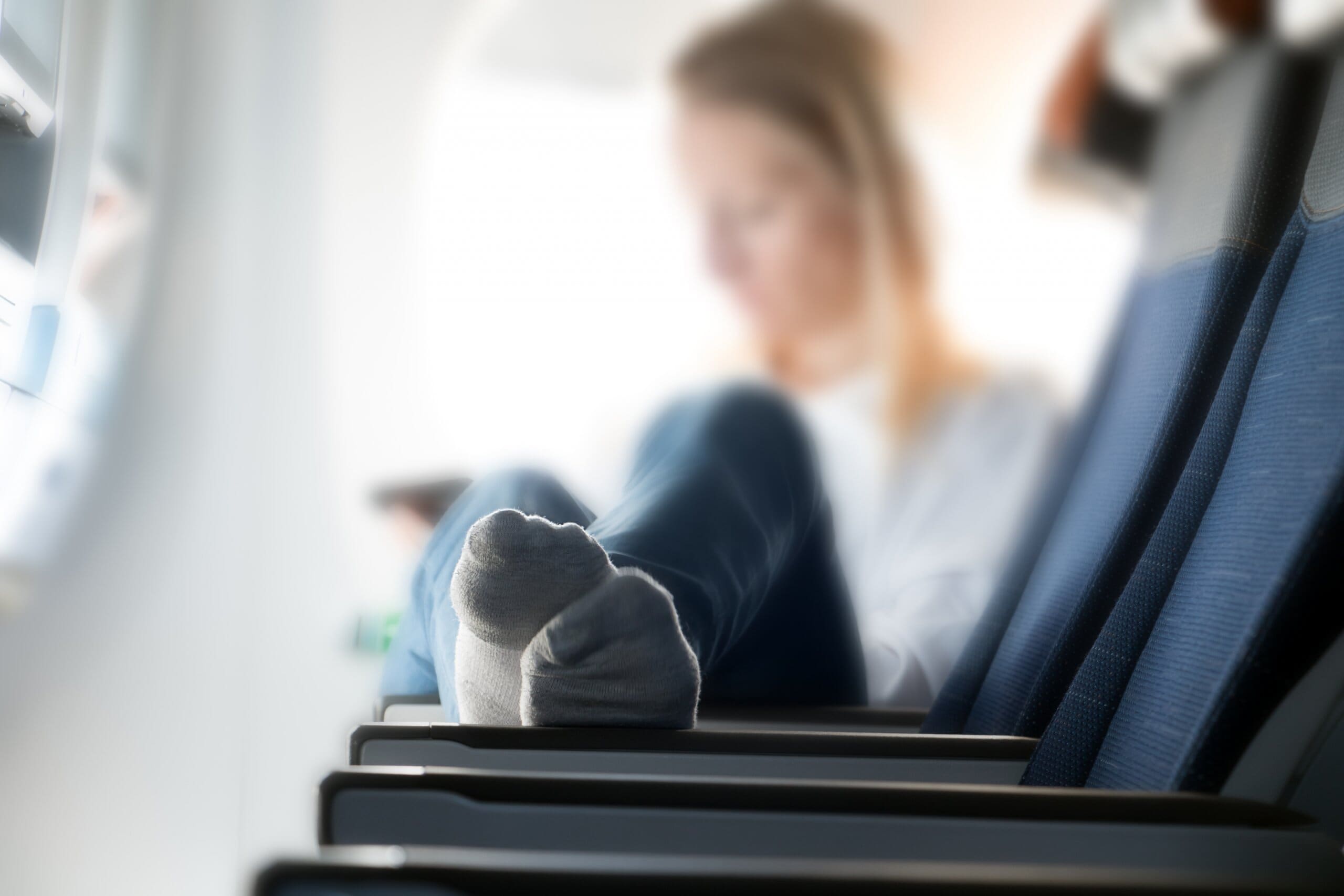
5. Change your clocks as soon as you sit on the plane
Our bodies are used to getting up and going to sleep at particular times of the day. This is a natural process called our ‘circadian rhythm’ that regulates when our bodies need to rest. If you’re travelling across time zones, you may find yourself struggling to adjust to new daylight hours as your internal clock gets used to new times, and as your body produces differing levels of melatonin – a hormone that helps you sleep.
As soon as you get on a plane, try changing your watches and phone clocks to match the time of your destination. This will help you ease into the time zone difference the moment your plane lifts off. If you have the time ahead of a long-haul flight, you can also try changing your sleep schedule two to three days before your trip to avoid jetlag when landing.
6. Download a white noise app for your journey
White noise is a sound made up of every frequency humans can hear played continuously. It’s known for helping to block out any unwanted sounds and distractions, making it useful for those who struggle to get to sleep. A 2021 study suggests white noise improves sleep for people who are kept awake by environmental noise.
Thanks to smartphones, it’s easy to find a white noise app that works for you without disrupting your fellow travellers. You can find white noise sleep playlists on Spotify, or download stories for while you sleep. Wellbeing apps like Headspace and Calm also have meditation guides that can help you settle down and get some rest.
White noise isn’t the only option for blocking out sound at bedtime. Read our guide on coloured noises and how they can help you sleep better for more information.
7. Avoid using wireless earphones
If you’re listening to anything on your phone while you travel, whether it’s white noise, music, podcasts, or audiobooks, you’ll need headphones if you don’t want to annoy the flyers around you! Since aeroplane cabins can reach volumes as loud as 85 decibels, you should ideally pack noise-cancelling headphones to fully focus on your own audio and block out any distractions.
However, if you have wireless earbuds, you may want to leave them in your carry-on and pack a different pair for when you sleep. Wireless earphones are small and easily fall out of your ear in the wrong position. Given their size, it’s easy to lose them under your seat should one come loose while you’re asleep.
We recommend using wired ones so you can always be sure of where they are. Over-ear headphones will take up more space in your bag, but they’re much easier to keep on, and usually better at blocking out unwanted noise.
8. Prepare a sleep kit which includes an eye mask, travel pillow, and flight socks
If you’re looking to sleep on your flight, try to come prepared. Packing a few small items into your carry-on that you can easily change into can help you get some well-earned rest.
We’ve already mentioned the benefits of flight socks, but some cosy cotton socks are a useful alternative if you find them uncomfortable. Studies suggest wearing socks while you sleep reduces night-time disruptions by 7.5 times!
An eye mask is also a must-have for anybody looking to block out unwanted light. They’re useful for daytime flights with the bright bulbs of the cabin, or for overnight trips to keep reading lights from stopping your sleep. We recommend finding one that fits your face shape rather than the lower-end masks offered by airlines, as these are comfier and better at blocking light.
A travel pillow can also provide extra support in a chair, protecting your neck and head to help you sleep upright. Memory foam travel pillows are recommended, as they mould to the shape of your neck for the best fit possible. If you’re not listening to anything while you sleep, we recommend also bringing earplugs to get some quiet.
9. Skip the alcohol on the aeroplane
It may feel easier to get to sleep after drinking alcohol, but your rest won’t be as high quality as when you’re sober. Instead, stay hydrated with water throughout your flight. This can also prevent the scratchy throat that many of us get from the dry air on a plane, meaning you won’t have to try sleeping with a cough. Fighting off thirst will help you sleep more easily, but try avoiding the hangover with a non-alcoholic option.
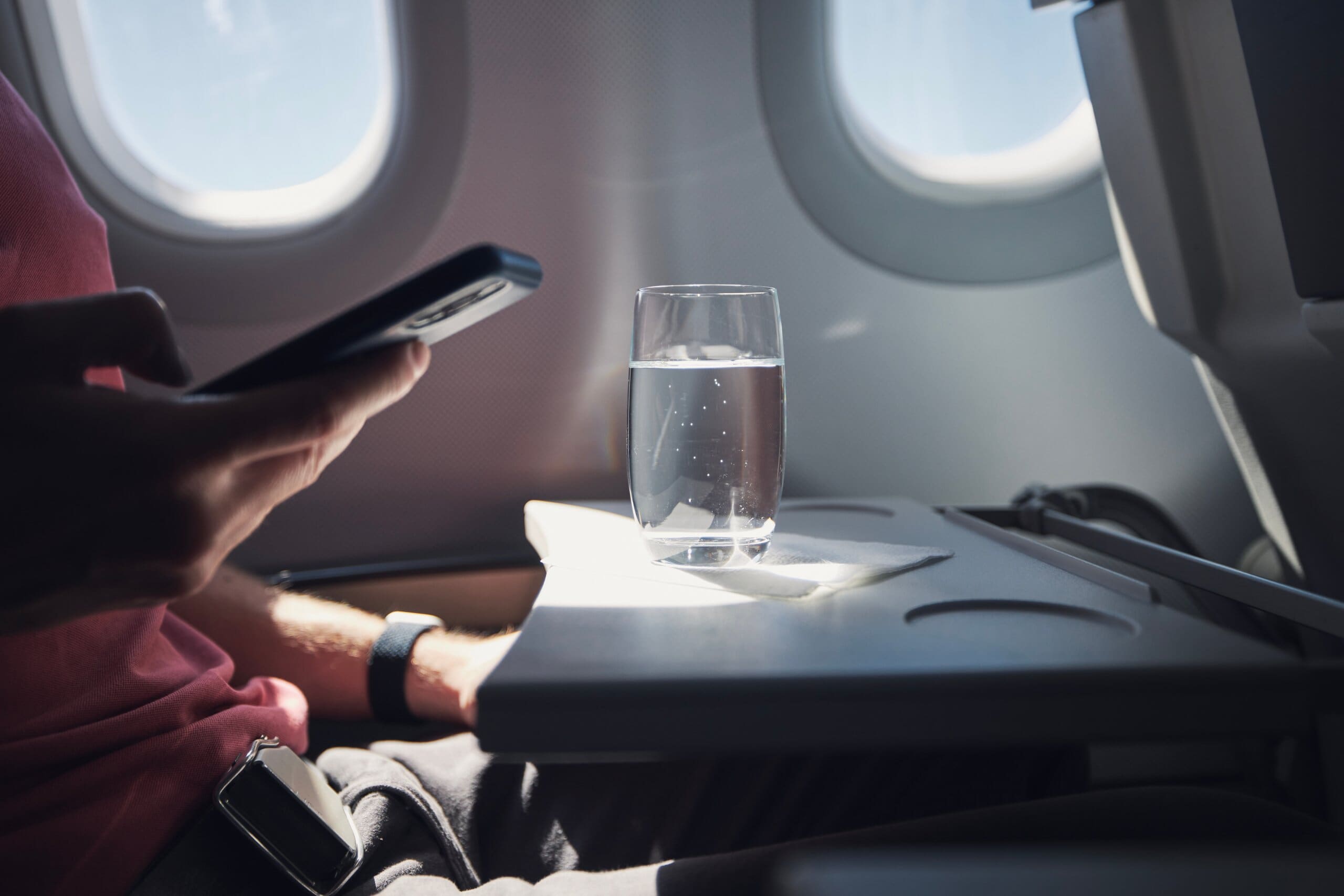
10. Opt for loose clothes
Planes are already tight on space, so to avoid feeling too cramped while you doze off, remember to wear loose-fitting clothes ahead of your flight. These will let you move around more freely so that you can find a comfortable position while sleeping. Your blood circulation will also be improved, causing fewer mid-sleep distractions. If you’re using flight socks, don’t forget to don these before getting some kip.
11. Ask what time the food will be served
We’ve all been there – finally drifting off to sleep after take-off, only to be woken by the question of “tea or coffee?”. Even if the cart doesn’t wake you up, others on your row switching their lights on or eating loudly can interrupt your rest.
This is why we recommend preparing for food service in advance and scheduling your sleep around it. You can also let the attendants know that you’ll be sleeping to avoid them waking you up as they deliver food.
12. Follow your child’s bedtime routine
Sleeping on a plane can be difficult as an adult, but even tougher for kids. If your child needs help getting rest during a flight, try replicating their bedtime routine at home as much as possible. Whether that involves brushing their teeth in the bathroom, reading them a story, or changing them into their pyjamas, they’ll be more comfortable drifting off if you can help them feel at home.
If you’re able to book a night-time flight, this will also let your children stick to their usual routine more easily without disrupting those around them. Other passengers will be asleep on these flights too, minimising any distractions.
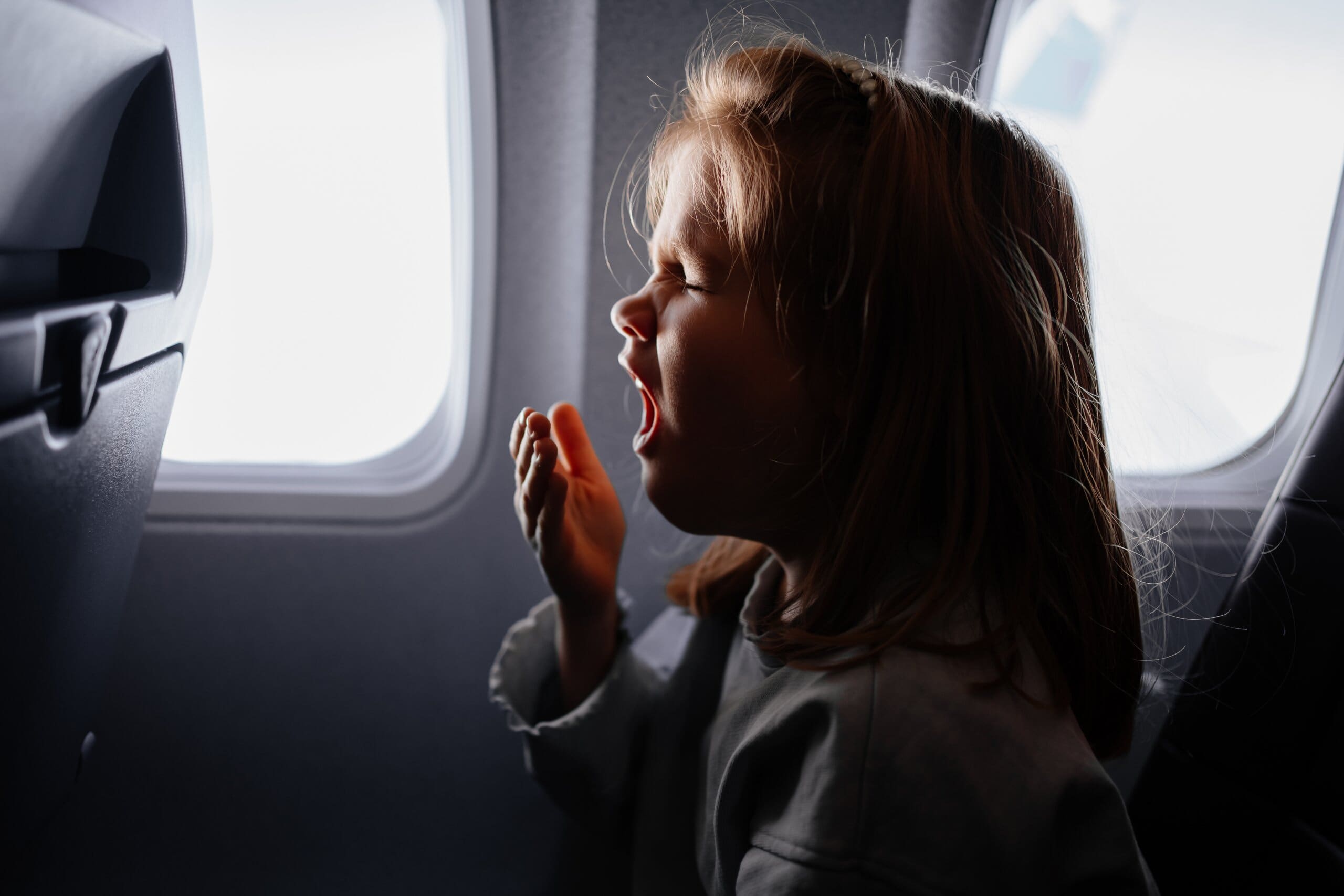
Get better rest every night with MattressNextDay
And there you have it; those are our top tips for how to sleep on an aeroplane. Of course, good sleep while you’re travelling isn’t the only time you should be practising good sleep hygiene. If you really want good rest, you need to be looking after your sleep each and every night!
So, if you are looking for even more tips, we’ve created the ultimate sleeping routine as recommended by our experts, as well as a guide on how to take the perfect nap, which will help if you only want to get a small amount of shut-eye on your journey. You can also shop our range of mattresses and beds right here on our website to make sure you're coming home to the perfect sleep set-up.
